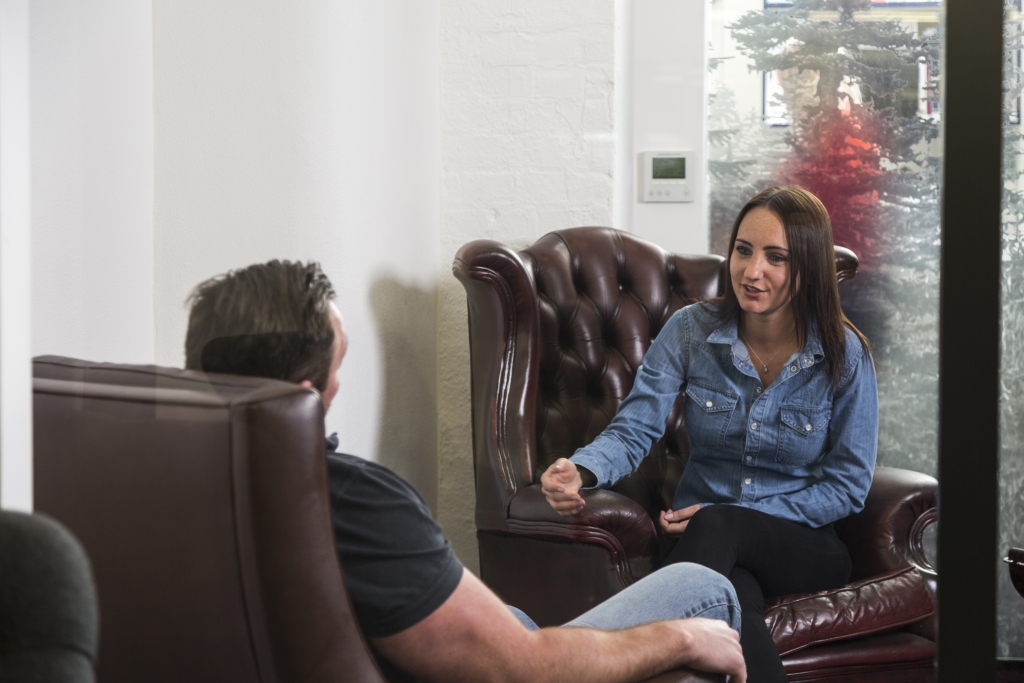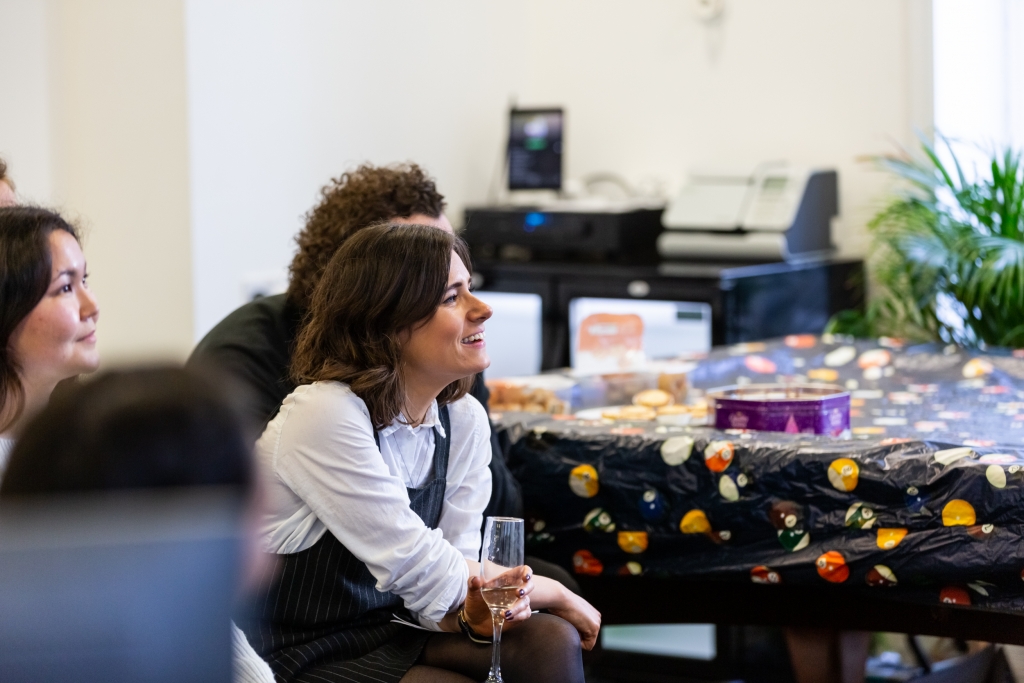What your employees expect from their workplaces…
Employees working needs and desires are forever evolving, making it hard for employers to know what your employees expect from workplaces today. Especially when it comes to understanding how our working environments and business practices can impact performance and happiness levels.
We are constantly bombarded with the latest tips and trends for keeping different generations engaged and productive within the workplace. But when it comes to attracting and retaining new talent, it is important for employers to understand what people really want and expect from work spaces today.
We believe there is no one better placed to enlighten us on this than those who have daily (sometimes even hourly) communications with their staff and hear first hand exactly what makes them tick.
People Director of the ThirdWay Group, Hannah Grothier and Head of People for property agent DeVono Cresa, Ruth Lynch, talk to us about how the needs in the office have changed over the last year and what staff expect from their work spaces today and going into 2020.

How has the needs of employees changed over the last year?
Ruth: “Employees now expect more agile working and workspace options. It is no longer a matter of coming into the office and sitting at the same desk day in day out. To keep productivity levels high they need ways and means to work remotely or from various areas within the office space. Employers need to be aware of and able to keep up with these growing needs in order to retain and attract talent. At DeVono Cresa we offer a variety of agile working areas for those that want a change of scenery away from their desks or just a little down time. However, I do think going into the new year we could really expand on this further and provide even more agile ways of working, whether its with work pods or soft seating areas, for those who want some quiet time but don’t want to miss out on the cultural benefits of working in the office.”
Hannah: “In terms of cultural interests and business values, this time last year I would say the focus was on a culture of everyone working together in the office and socialising together. The transition this year has been that millennials are now more focused on their physical and mental health, therefore flexible working and ensuring your people have a variety of working options available to them is key in supporting this. At ThirdWay in particular we have noticed that our people are less interested in a culture of drinking and socialising and more interested in a culture of care, recognition and development. I strongly believe that recognition is the key to maintaining retention of your employees, rewarding hard work as often as possible so employees feel valued and cared for.
“People are less interested in a culture of drinking and socialising and more interested in a culture of care, recognition and development.”
“In terms of the physical office, agile working has been a continued focus over the last few years. Business owners need to ensure their office has comfortable breakout spaces and social spaces for collaborative working and general downtime. Whilst this is still important, with technology constantly evolving and consequently increasing flexibility by allowing people to work together from anywhere, adjustable working hours and locations has become a must. The need to not just go to a breakout area within the office but have the ability to work from home or away from the office to have clear focus time and mentally recharged is highly important for employees today and will continue to be so over the next 12 months.”
What do employees expect from their working environments?
Ruth: “Comfort and wellness is a huge aspect of our working lives and employers need to be more aware of this when looking at their business policies and benefits . The option to sit or stand at your desk makes a huge difference to motivation levels especially in busy teams such as business development. Wellbeing in the office is no new requirement, but it is a developing one that involves really thinking about the space around us, from lighting, air control, and even music. It has become apparent that people now expect the workplace to take responsibility in providing ways to support and help their mental health needs – so having breakout areas that can accommodate mindfulness, meditation or other wellbeing activities is becoming the norm and no longer considered a ‘perk’. Today’s millennial’s are really invested in their diet and healthy eating options too, so the office biscuit tin just doesn’t cut it anymore. Workplaces should be promoting wellbeing with healthier snacks and fitness schemes.”
“It has become apparent that people now expect the workplace to take responsibility in providing ways to support and help their mental health needs”
Hannah: “Employees will be on the hunt for attractive wellness packages when weighing up their employment options. Wellbeing refers to a more holistic experience whereas wellness is ensuring that you have a wide range of initiatives that look after the health, happiness and quality of your employees personal and professional life. The importance of having attractive wellness benefits such as health care, pension, mental health support, combined work perks such as healthy lunches and fresh fruit deliveries, to professional coaches and flexible working days is now more significant than ever.
Sustainability is another consideration for employers to think about when going into the new year. Reducing your carbon footprint as a business and looking after the environment is not just about recycling paper anymore. Businesses need to be taking responsibility where possible for their office overheads, whether that’s ensuring all products are locally sourced or avoiding the use of non-biodegradable materials. Essentially as a business you should now be considering ways to contribute to Good Health & Wellbeing, Gender Equality, Affordable & Clean Energy, Decent Work & Economic Growth, Reduced Inequalities, Responsible Consumption & Production.
How do these changes impact businesses?
Ruth: “As discussed, agile working is the direction the working world has been heading and will continue to head over the next couple of years. With employees having the option to work from different locations around the office or away from the office when required, businesses will really notice an increase in performance levels. However, with that said, for small businesses, there is always the risk of this new freedom and flexibility jeopardising your company culture, so it is important to find the right balance for different working needs, whilst also encouraging people to still want to be in the office.”
Hannah: If employers continue to evolve and are always thinking ahead of what could be improved on or what you could do more of to enhance your employee experience, the impact on business performance will be extremely positive. However, it is important to get this right, as with this a sense of employee entitlement could arise. As wellness and flexibility is now becoming the norm, what businesses currently see as ‘perks’ are instead becoming the expected which I suspect will make employee retention and attraction even more challenging in the near future. This is something business owners must be aware of and ensure they have a clear and defined balance of what is a ‘necessity’ and what is a ‘nicety’ in terms of benefits for their employees.
Is there anything you are already preparing for in 2020?
Ruth: “Businesses should be preparing for an enhanced focus on work -life balance. This is a big selling point for people today and is key to supporting staff happiness in my opinion. I think People Directors, Head of People and Human Resources have a continued endeavor to get this right and this is only going to become more significant in 2020.”
“Whilst technology and AI continues to evolve and assist us with our different working needs, this will also change the dynamics of the workplace over the next few years and make working relationships and communication even more challenging.”
Hannah: “I believe the need to maintain human centric relationships within the workplace will gain more momentum throughout the next year and take even more prominence in our working practices. Whilst technology and AI continues to evolve and assist us with our different working needs, this will also change the dynamics of the workplace over the next few years and make working relationships and face to face communication even more challenging. Therefore, finding ways to connect with your employees mental and emotional wellbeing will need to be a key focus for ensuring your people still have meaningful relationships that entice them to work from the office rather than working alone.”
What advise would you give to small /medium sized businesses looking to enhance their employee engagement?
Ruth: “My advise to employers would be to invest in having a workplace that meets the different working needs of employees today. Whilst this may seem like a costly and timely expense, the return for the business will be immeasurable.”
Hannah: “You must ensure your business is on top of flexibility, wellness, technology and environmental developments. You will only get out what you put in, and cannot expect more until you do more. My advise would be to invest in effective and up to date technology, a well designed work space for your staff to work in, hang out and recharge, and finally ensure your business practices have lots of emphasis on employee wellness and soft perks.”
If you need more advise on how to enhance your employee engagement get in touch and one of the team will be more than happy to help!
Or if you simply want some inspiration take a look at our latest projects to see how we have helped other companies improve their business performance and retention.

